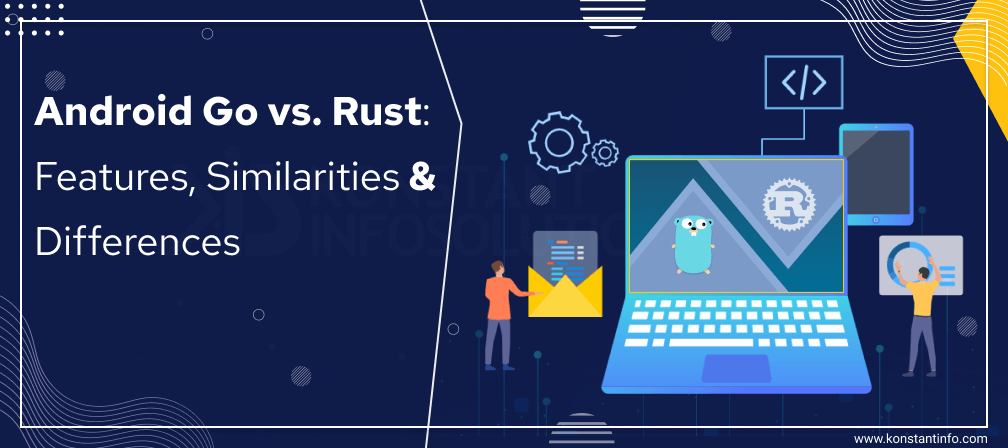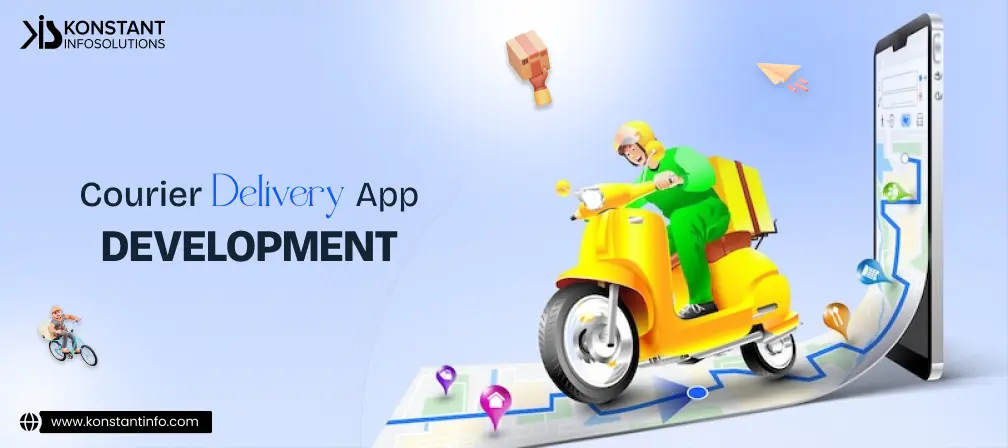
Table of Contents
Both Golang vs. Rust come forth with incredible features like integrated tool-chain, memory safety, open-source development model and strong community for modern software development. But they are designed to touch different niches, replenish different demands, and the coding structure and application architecture are different. This selection is not for crowning a particular language to be objectively better, instead, we intend to justify the aptness of a programming language for a certain task.
RUST programming language attempted to be amongst the top 20 world’s most popular programming languages since the last few months (updated through June 2020). A popular reason for this is the arrant simplicity that RUST comes with. Being strongly typed, RUST application development is not as tedious as other languages. The architectural design of a RUST application varies drastically from one application to the next in the context of its purpose. ‘Rustaceans’ – (the name is chosen for a pun on RUST Developers) do adopt a methodical process in laying out the architectural design of the application before a single line of code gets written as a part of:
Additionally, the presence of type system prevents run-time null pointer exceptions. The memory is calculated during compilation. This makes the application escape the garbage collection.
RUST can be used especially in time/space-constrained scenarios like microcontrollers. RUST also comes with web assembly. It can be used to build tools that compile to web assembly and run in a browser. It is a near counterpart to C++, solving problems with similar ease.
Golang (GO) Programming Language was designed and is used by ‘Golangians’ – (the name is chosen to add a pun on the catchword i.e. Golang developers) to get rid of computation clusters, web programming models, to handle garbage collection and to adapt across advance systems for software architectures on server-side. Golang programming language is pragmatic, effective, concise and flexible. It streamlines the coding process and makes the overall programming more productive and agile. Go can be perceived as a successor of Java since it can be used to build distributed systems. E.g: Kubernetes, Docker – were written in Go.
Also read: Rust vs Go
| Parameter | RUST | GOLANG (GO) |
|---|---|---|
| Origin | Developer: Mozilla Research | Developer: The Go Authors |
| Latest Version | 1.43.1 (Updated June 2020) | 1.14.3 (Updated June 2020) |
| Performance | Highly performant; is slightly faster than Swift programming language | GO and JAVA is less performant than RUST programming language. |
| Ease of Use | Very easy and safe to use with zero-cost runtime abstractions for memory handling and processing | Easy to use and manage. |
| Ease of Learning | Developers do need to apply some effort to learn and master the language’s abstractions for memory management. | It comes with complete documentation and has a large community of users. |
| Memory Management | RUST makes use of compile-time ownership strategies with zero-cost abstractions for managing memory in the apps. A RUST program compiles only when it is 100% memory safe. This resolves a lot of issues before the program goes live. | Golang has ‘Go-runtime’ to handle runtime-associated overhead. This makes is faster than its counterparts like Python. |
| Speed of Development | RUST programs take longer to compile in comparison to Go programs | GO is simple and fast |
| Concurrency and Parallelism | RUST does not have concrete concurrency or asynchronous operations. | Go has go-routines (lightweight threads) and channels (communication mechanism for go-routines) to ease the process of app creation. It has native test mechanisms to warn about Race conditions at runtime. |
| Interoperability with legacy code | RUST can interface code at higher levels like interacting with the C libraries directly with extern keywords and via calling libc “crate” libraries. RUST cannot guarantee memory or thread safety, Calling into c++ code isn’t supported. | Interoperability comes with a speed overhead – Go provides the cgo package for working with C. As Go is memory-managed and garbage-collected, it needs to be ensured that any pointers that are passed to C are handled correctly. |
| Advantages |
|
|
| Disadvantages | RUST comes with an extremely high speed It takes care of normal C++ memory issues, has simple API’s makes it easy to learn and use. But RUST is still more complicated than Swift or Kotlin. The challenge is to build a proper bridge between RUST and client frameworks. |
|
| Similarities |
| |
| Improvements |
|
|
Both Rust and Go share some similarities
While selecting the best amongst the given two programming languages, it depends more upon the programming background rather than the specific problem that we resolve. A startup or a small scale organization may choose Go especially when they need speed and growth. RUST can be taken up my mid-to-large scale enterprises, who are experienced programmers as it can be relatively difficult to pick. Come to us with your queries on RUST App Development vs. Go App Development, we’re happy help!
Golang is an open-source programming language created by Google. Go is still a great choice for real-time application development, networking apps, cloud-based interfaces, and micro-services.
Golang is fast, has a quick development cycle, incredible speed, memory safety, good for DevOps and micro-services.
Rust is an open-source programming language that focuses on safety and speed, using to create various reliable and efficient software applications, such as operating systems and simulation engines for virtual reality.
Rust programming language used for better performance, more reliability and more productivity.



Vipin Jain is the Co-Founder and CEO at Konstant Infosolutions and is in charge of marketing, project management, administration and R&D at the company. With his marketing background, Vipin Jain has developed and honed the company’s vision, corporate structure & initiatives and its goals, and brought the company into the current era of success.
Or send us an email at: [email protected]